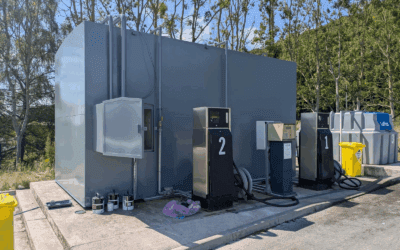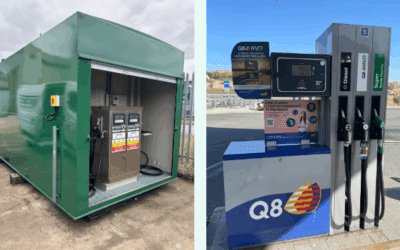
As governments and public sector organisations evaluate HVO fuel vs electric vehicles in their efforts to meet stringent sustainability targets, the transition from fossil fuels has gained urgency. Electric vehicles (EVs) were once heralded as the primary solution to decarbonising fleets, but recent trends reveal significant challenges. Rising costs, infrastructure limitations, and consumer hesitancy have dampened enthusiasm for EVs. For public sector fleets, the need for a sustainable, cost-effective, and reliable alternative is greater than ever.
Hydrotreated Vegetable Oil (HVO) fuel is emerging as a practical and immediate alternative to electric vehicles, offering operational and environmental benefits without the infrastructure and financial barriers of electrification, making it an important consideration in the HVO fuel vs electric vehicles debate.
Slowing Electric Vehicle Adoption
Despite the growing momentum around EVs, the market is facing notable setbacks. EV sales in Europe and the UK have stagnated, with a sharp decline in demand due to high costs and limited charging infrastructure. In Germany, electric car sales have plummeted by 32%, and across the EU, registrations are down by more than 8%. Similarly, the UK market is struggling, with EV adoption rates failing to meet ambitious government targets. These setbacks raise critical questions regarding the use of HVO fuel vs electric vehicles for public sector fleets, where the need to meet sustainability goals must be balanced with cost-effectiveness and operational reliability.
In the comparison of HVO fuel vs electric vehicles, EV adoption is hindered by several factors, including the cost of vehicles and the prohibitive expenses associated with public charging. For instance, motorists without access to home charging face significantly higher running costs. Rapid chargers are now so expensive that running an electric vehicle can cost twice as much as using a petrol or diesel car.
HVO Fuel vs Electric Vehicles: A Practical Comparison
When considering HVO fuel vs electric vehicles, Hydrotreated Vegetable Oil (HVO) fuel offers a viable alternative for public sector fleets looking to meet environmental goals without the financial and logistical challenges posed by electric vehicles. Here are key reasons why HVO is a practical and sustainable solution:
- No Infrastructure Changes
Unlike EVs, which require significant investment in charging infrastructure, HVO fuel can be used immediately in existing diesel engines. For public sector fleets with extensive diesel-powered vehicles, this compatibility allows for a seamless transition to lower-emission operations without costly retrofitting or infrastructure upgrades. This is particularly appealing to procurement managers and fleet operators who need to manage tight budgets while progressing toward sustainability. - Cost-Effectiveness
HVO fuel offers cost savings in comparison to the high upfront and ongoing costs associated with EVs. While the purchase price of EVs remains significantly higher than diesel counterparts, HVO can be deployed without major capital expenditure. Additionally, the operational savings from longer shelf life, improved cold-weather performance, and reduced engine wear make HVO an economically sound choice for fleet managers. - Immediate Environmental Impact
One of the most compelling benefits of HVO fuel is its ability to reduce greenhouse gas (GHG) emissions by up to 90%, making it a highly effective solution for fleets aiming to meet decarbonisation goals . For public sector fleets under pressure to meet net-zero targets, HVO presents an immediate, impactful solution. It allows fleet operators to achieve substantial carbon reductions without the delays and uncertainties associated with transitioning to electric vehicles. - Operational Reliability
Public sector fleets, such as those used by emergency services, cannot afford downtime due to charging limitations or range anxieties. HVO fuel ensures that vehicles maintain their full operational capabilities, particularly in high-demand and critical roles such as fire, police, and ambulance services. Unlike EVs, which can suffer from performance degradation in cold weather or long-distance operations, HVO provides reliable performance in a wide range of conditions.
Addressing the Challenges of Electric Vehicles
The challenges facing electric vehicle adoption are not easily overcome. The UK’s public charging infrastructure, although growing, remains expensive and insufficient to meet the needs of widespread EV adoption. Moreover, the high initial costs of EVs, compounded by public hesitancy regarding range limitations and battery longevity, make HVO an attractive stopgap solution for fleets that need immediate results.
In the ongoing evaluation of HVO fuel vs electric vehicles, procurement managers and local government officials, responsible for meeting both sustainability goals and financial constraints, must consider the practicality of alternative solutions like HVO. The growing infrastructure for electric vehicles may not be sufficient in the short term, leaving public sector fleets vulnerable to higher costs and operational risks. By adopting HVO, public sector fleets can maintain their sustainability trajectory without the economic burdens and uncertainties tied to electric vehicles.
Conclusion
In the ongoing evaluation of HVO fuel vs electric vehicles, it is clear that public sector fleets need immediate and practical solutions to meet their decarbonisation goals. HVO fuel offers a compelling alternative, providing environmental benefits, cost savings, and operational reliability without the infrastructure challenges of EVs. For fleet managers and procurement officials tasked with balancing sustainability and fiscal responsibility, HVO fuel represents the most effective interim solution as the world transitions toward a greener future.
By leveraging the advantages of HVO fuel, public sector fleets can reduce their carbon footprint, manage operational costs, and avoid the complexities of electric vehicle adoption, ensuring that in the HVO fuel vs electric vehicles transition, they remain both environmentally and economically sustainable in the years to come.








